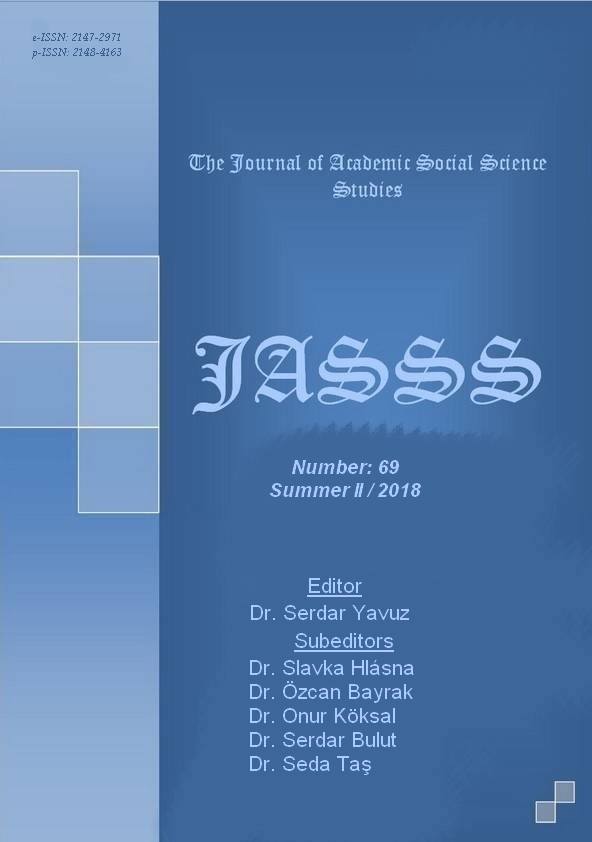TURİZM EĞİTİMİ ALAN ÖĞRENCİLERİN KARİYER STRESLERİNİN BELİRLENMESİ : GİRESUN ÜNİVERSİTESİ ÖĞRENCİLERİ ÜZERİNE BİR ARAŞTIRMA
Author :
Abstract
Günümüz eğitim ve iş hayatı ilişkisinde, eğitimlerine devam eden öğrencilerin diplomalarını aldıktan sonra hangi işi yapacaklarına ilişkin stresleri önemli bir konudur. Üniversite tercih aşamasında başlayan bu stres faktörü, eğitim yaşamları boyunca da devam etmektedir. Gelecekle ilgili kariyer streslerine yönelik öğrenci algılamalarının belirlenmesi, stres kaynaklarının azaltılmasına olanak sağlayacak çözümlere ulaşılmasını kolaylaştıracaktır. Bu çalışmanın amacı, Giresun Üniversitesi Bulancak Kadir Karabaş Uygulamalı Bilimler Yüksekokulu ve Sosyal Bilimler Meslek Yüksekokulunda turizm eğitimi alan lisans ve önlisans öğrencilerinin kariyer streslerini belirlemektir. Çalışma, öğrencilerin eğitimleri sırasındaki kariyer streslerinin belirlenmesi ve çözüm yollarının araştırılmasına ışık tutması bakımından önem arz etmektedir. Bu amaç doğrultusunda, 223 öğrenciye yüzyüze anket tekniği ile kariyer beklentileri ve endişelerine yönelik olarak sorular sorulmuştur. Anket formuyla elde edilen veriler SPSS 21.0 paket programıyla analiz edilmiştir. Veriler analiz edilirken, öğrencilerin demografik ifadelerinin yorumlanmasında frekans ve yüzde dağılımı yapılmış, kariyer stresine yönelik algılamaların hangi boyutlardan oluştuğunu ve ölçeğin geçerliliğini sağlamak amacıyla da açımlayıcı faktör analizi yapılmıştır. Elde edilen boyutların demografik özelliklere ilişkin farklılıkları test etmek amacıyla ikili değişkenler için t-testi, üç ve daha fazla değişkenler için ise varyans analizinden yararlanılmıştır. Araştırmada elde edilen bulgular, öğrencilerin kariyer stresleri ile ilgili en büyük endişelerinin iş bulma baskısı olduğunu, bunun ardından ikinci en önemli stres kaynağının kariyer belirsizliği ve bilgi eksikliği olduğunu ve üçüncü önemli stres faktörünün ise dışsal çatışma boyutu olduğunu ortaya çıkarmıştır.
Keywords
Abstract
In today's education and business life relation, the stress regarding what to do after taking the diploma is an important issue for students who are continuing their education. This stress factor which begins at the university preference stage continues throughout the education life. Determining student perceptions related to career stresses for the future will make it easier to find solutions which will provide opportunities to reduce sources of the stress. The aim of this study is to determine the career stresses of undergraduate and associate degree students who are receiving tourism education at Giresun University Bulancak Kadir Karabas School of Applied Sciences and Social Sciences Vocational School. The study is important with respect to determining the career stresses of the students during their education life and providing solution. In accordance with this purpose, 223 students were asked questions regarding their career expectations and concerns through face-to-face questionnaire method. Data acquired with the questionnaire were analyzed with SPSS 21.0 package program. While the data were being analyzed, frequency and percentage distribution was carried out in interpreting the demographic expressions of the students and exploratory factor analysis was performed in order to determine the dimensions that the perceptions related to career stress have and provide the validity of the scale. In order to test the differences related to demographic characteristics of the obtained dimensions, the t-test was used for binary variables and the analysis of variance was used for three or more variables. Findings that were acquired in the research revealed that the biggest concern of the students regarding their career stress was job finding, followed by career uncertainty and lack of knowledge which were the second most important stress sources and the third important stress factor was the external conflict dimension.





